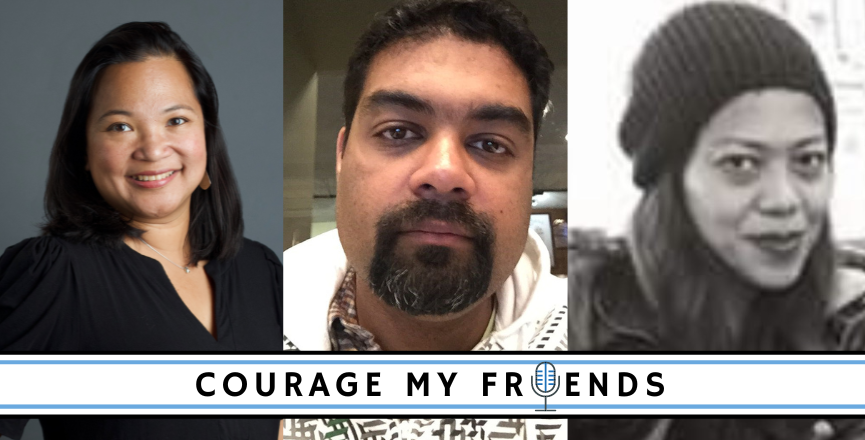
Migrant workers and 'the pandemic paradox': The unseen hands that truly keep us afloat
 2022-09-26
2022-09-26
In the second episode of the Courage My Friends podcast, Series III, Jhoey Dulaca (caregiver and organizer with the Migrant Workers’ Alliance for Change), Ethel Tungohan (Canada Research Chair in Canadian Migration Policy, Impacts and Activism) and Chris Ramsaroop (activist and organizer with Justicia for Migrant Workers) discuss temporary foreign workers in Canada, the multiple and barriers they face and the struggle for recognition, rights and belonging.
Speaking to the situation facing foreign migrant workers, Dulaca says, “In the beginning it was a dream. It's not what happens in reality. The promise of Canada is when you get in, you are allowed to apply for permanent residence. That's the selling point, why I came here… They allow you to come here, but they won't allow you to have permanent status. And with permanent status, you are exercising your rights.”
Dulaca continued: “A lot of these people are tied to their employers. When I was working as a caregiver, I was tied to my employer and I couldn't do anything. If I was being abused, I couldn't just go and look for [other] work. Just like the farm workers, they're tied to their employers and the system is made for them to shut up. First and foremost migrants come here to support their family. ..That's what makes it hard for workers to stand up for their rights.”
As Tungohan says, the situation facing these workers is structured into the system itself: “The thing about Canada that I find very perplexing is that it's always been constructed as a liberal immigrant receiving state. And to a certain extent that's true, but only for certain groups of people. So the easiest way to think about Canadian immigration policies is that there's citizen-track immigration and non-citizen- track immigration. And I would argue that temporary labor migrants tend to fall [in] the latter group.”
On speaking to the need for organized resistance, Ramsaroop says: “It's about the role of power and asymmetrical power imbalances..There are no industry specific regulations. And coupled with this constant threat of deportation and permanent loss of work, this is why workers are .. working at heights without protections, being sprayed with pesticides and chemicals, working at a peace-rate system which has numerous and multiple forms of injuries on their bodies.So it is critically important to see this as structural violence .. This is an entire system that's been built to meet the needs of the employers, not thinking about the needs of workers. And this is why trying to build power across the industry and across all forms of temporary work is necessary and essential to change the power imbalance that exists.”
About today’s guests:
Ethel Tungohan is the Canada Research Chair in Canadian Migration Policy, Impacts and Activism, and associate professor of Politics and Social Science at York University. She has also been appointed as a Broadbent Institute fellow. Previously, she was the Grant Notley Postdoctoral fellow at the University of Alberta’s Department of Political Science.
Her research looks at migrant labor, specifically assessing migrant activism. Her forthcoming book, “From the Politics of Everyday Resistance to the Politics from Below,” won the 2014 National Women’s Studies Association First Book Prize. Her work has been published in academic journals such as the International Feminist Journal of Politics, Politics, Groups, and Identities, and Canadian Ethnic Studies. She is also one of the editors of “Filipinos in Canada: Disturbing Invisibility,” which was published by the University of Toronto Press in 2012. Dr. Tungohan specializes in socially engaged research and is actively involved in grassroots migrant organizations such as Gabriela-Ontario and Migrante-Canada.
Joelyn Dulaca is a careworker organizer with Migrant Workers Alliance for a Change which is a coalition of migrant careworkers, healthcare workers, farmworkers and international students. A former careworker herself, who had to work away from her children to chase the Canadian dream; she had experienced the struggles of working as a live-in caregiver and is now dedicated to organize caregivers to fight for better immigration, labour laws and permanent status for all.
Chris Ramsaroop is an organizer with Justicia for Migrant Workers, a grassroots activist collective that has been organizing with migrant workers for nearly 20 years and whose work is based on building long term trust and relationships with migrant workers and includes: engaging in direct actions, working with workers to resist at work, launching precedent setting legal cases, and organizing numerous collective actions.
Chris is an instructor in the Caribbean Studies Program at the University of Toronto and a clinic instructor at the University of Windsor, Faculty of Law. Ramsaroop is working to complete his PhD at OISE/University of Toronto. Chris is also currently assistant professor at New College, University of Toronto, Community Engaged Learning.
Transcript of this episode can be accessed at georgebrown.ca/TommyDouglasInstitute.
Image: Ethel Tungohan, Jhoey Dulaca, Chris Ramsaroop / Used with Permission
Music: Ang Kahora. Lynne, Bjorn. Rights Purchased
Intro Voices: Ashley Booth (Podcast Announcer); Bob Luker (voice of Tommy Douglas); Kenneth Okoro, Liz Campos Rico, Tsz Wing Chau (Street Voices)
Courage My Friends Podcast Organizing Committee: Chandra Budhu, Ashley Booth, Resh Budhu.
Produced by: Resh Budhu, Tommy Douglas Institute and Breanne Doyle, rabble.ca
Host: Resh Budhu
More Episodes
 2024-09-10
2024-09-10
 2024-03-12
2024-03-12
Create your
podcast in
minutes
- Full-featured podcast site
- Unlimited storage and bandwidth
- Comprehensive podcast stats
- Distribute to Apple Podcasts, Spotify, and more
- Make money with your podcast
It is Free
- Privacy Policy
- Cookie Policy
- Terms of Use
- Consent Preferences
- Copyright © 2015-2024 Podbean.com





